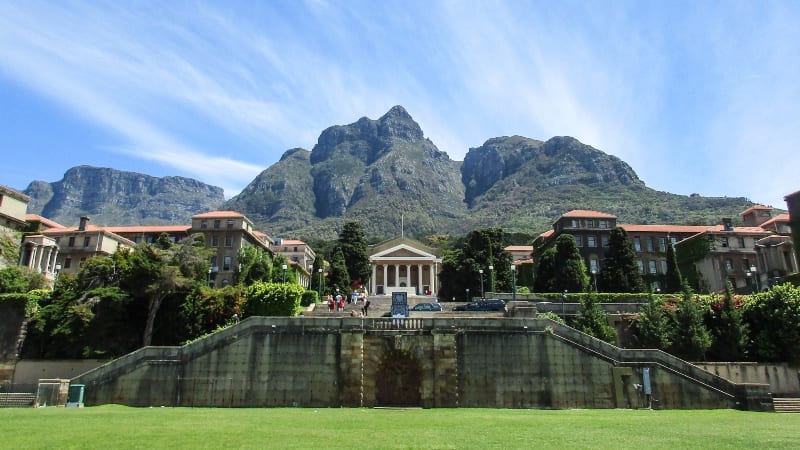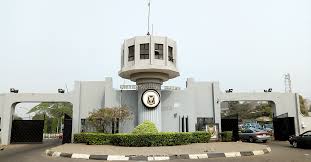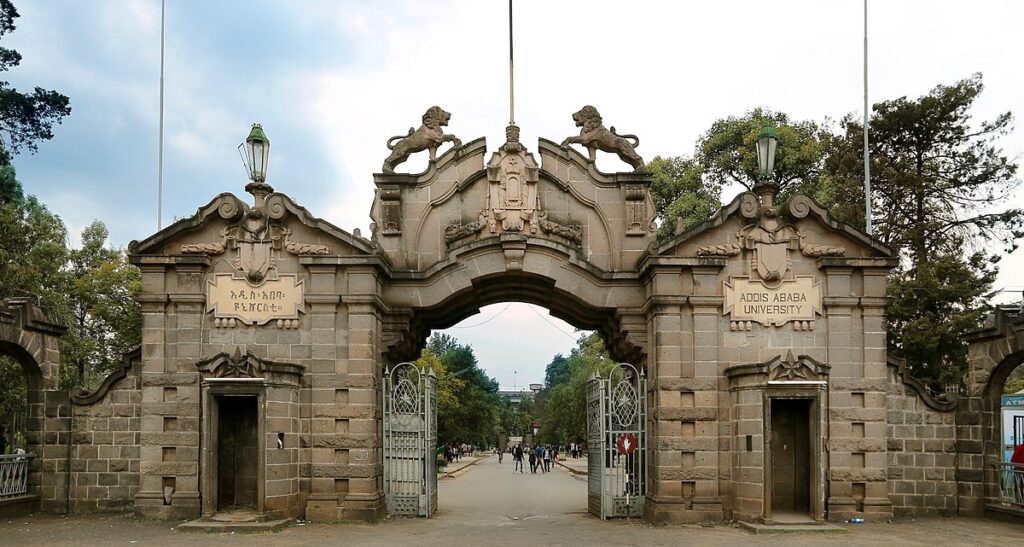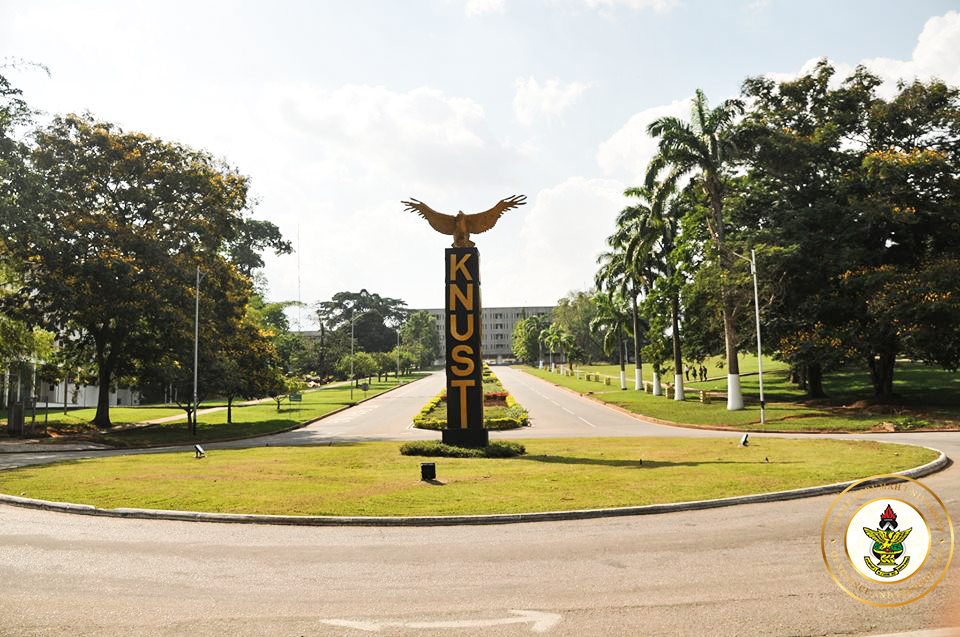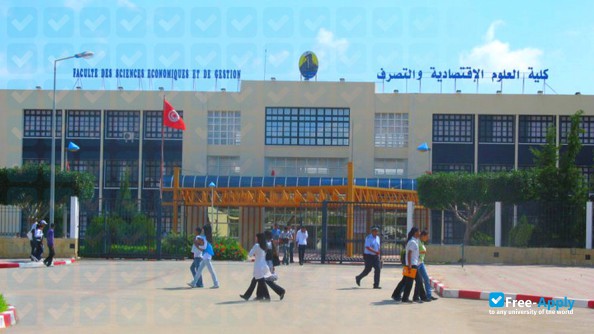Based on the university’s research performance and academic reputation overall, the following universities made our list of the top 10 universities in Africa.
It is important to note that some countries have multiple top-ranking schools (looking at you South Africa) and to provide a broader look at universities in Africa, we have opted to allow just one entry per country.
The University of Cape Town (UCT), located on the slopes of Devil’s Peak in Cape Town, UCT is South Africa’s oldest university, and is one of Africa’s leading teaching and research institutions. Established in 1829, initially as a high school for boys, it is now home to more than 25,000 students and close to 1,000 academic staff members. UCT attracts a large number of international students who currently make up close to 20 percent of the student body.
UCT aspires to become a premier academic meeting point between South Africa, the rest of Africa and the world. Taking advantage of expanding global networks and a distinct vantage point in Africa, UCT is committed, through innovative research and scholarship, to grapple with the key issues of natural and social worlds. UCT aims to produce graduates whose qualifications are internationally recognised and locally applicable, underpinned by values of engaged citizenship and social justice.
Cairo University is Egypt’s premier public university with the main campus located across the Nile in the large metropolis of Giza. CU is the second oldest institution of higher education in Egypt and includes a School of Medicine and a School of Law. Notable alumni include the former United Nations secretary-general Boutros Boutros-Ghali, Omar Sharif, the Oscar-nominated actor, Mohamed Morsi, a former president of Egypt, Amr Moussa, secretary-general of the Arab League from 2001 to 2011, and three Nobel Laureates.
One of the 50 largest institutions of higher education in the world by enrollment, Cairo University provides several academic and non-academic facilities and services to students including a library, housing, sports facilities, financial aids and/or scholarships, study abroad and exchange programs, online courses and distance learning opportunities, as well as administrative services. International students living in Cairo enjoy relatively low living costs and access to some of the world’s ancient attractions.
Established in 1948, the University of Ibadan (UI), is the first university founded in Nigeria. It is a comprehensive citadel of learning with academic programmes in sixteen Faculties. UI is well acknowledged within and outside the country as one of the largest in Africa and the flagship of Postgraduate Education in Nigeria. The Postgraduate School enrollment takes about 50% of the entire student enrollment. University of Ibadan produces an average of 3,000 Masters & 250 Ph.Ds every year.
Through its alumni and alumnae, the University of Ibadan has, in the past six decades contributed significantly to the political, industrial, economic and cultural development of Nigeria.
UI graduates, staff and students are making great impact on the world through new discoveries, innovations and inventions in science, medicine, agriculture, business and technology.
Popularly known as Unibadan or UI, it is located five miles (8 kilometres) from the centre of the major city of Ibadan in Western Nigeria.
Addis Ababa University (AAU), which was established in 1950 as the University College of Addis Ababa (UCAA), is the oldest and the largest higher learning and research institution in Ethiopia. Since its inception, the University has been the leading center in teaching-learning, research and community services.
Beginning with enrollment capacity of 33 students in 1950, AAU now has 48,673 students (33,940 undergraduate, 13,000 Master’s and 1733 PhD students) and 6043 staff (2,408 academics and 3,635 support staff). In its 14 campuses, the University runs 70 undergraduate and 293 graduate programs (72 PhD and 221 Masters), and various specializations in Health Sciences.
In recent years, the University has been undertaking various reform schemes in order to cope with and respond to the fast-changing national and international educational dynamics. At present the University has 10 colleges, 4 institutes that run both teaching and research, and 6 research institutes that predominantly conduct research. Within these academic units, there are 55 departments, 12 centers, 12 schools, and 2 teaching hospitals.
Kwame Knrumah University of Science & Technology is located in the urban setting of the metropolis of Kumasi (population range of 1,000,000-5,000,000), Ashanti region in Ghana.
The university is globally recognized as the premier center of excellence in Africa for teaching in Science and Technology, producing high-caliber graduates. Faculties and Schools include Agriculture, Engineering, Art, Science, Medicine, Architecture, Pharmacy, Renewable & Natural Resources, Mining and Mineral Engineering, Land Management, and Environmental Studies.
KNUST has a selective admission policy based on entrance examinations and students past academic records and grades. The admission rate range is 30-40% making this Ghanaian higher education organization a very selective institution. International students are welcome to apply for enrollment. KNUST also provides several academic and non-academic facilities and services to students including a library, housing, sports facilities, financial aids and/or scholarships, study abroad and exchange programs, online courses, and distance learning opportunities
Established in 1975, this public university is located in Aïn Chock, an arrondissement and southern suburb of Casablanca, Morocco.
Faculties include the faculty of law, economic and social sciences, the faculty of medicine and pharmacy, the faculty of dentistry, the faculty of sciences, and the faculty of arts and humanities. There is also a graduate school of technology and a school of mechanical engineering. The National School of Business and Management of Casablanca (ENCG Casablanca), located in Aïn Sebâa was established in 2007 and frequently tops the lists of the best business schools in the country.
Arabic and French are the key teaching languages and for some courses like law and international law, both languages are imperative. Although all technical courses are offered in French only.
Foreign students are largely from French-speaking countries: Senegal, Democratic Republic of Congo, Congo, Mauritania, Libya, Tunisia, Algeria, Mali, Yemen, Indonesia, Malaysia, and France.
Founded in 1922, and later becoming an independent national university in 1970, Makerere University is Uganda’s largest and oldest public university. The university developed a focused research agenda in line with the national government’s policy objectives, and seeks to support those programs with a multidisciplinary approach ranging from natural sciences to economics and education.
Spread across three campuses, Makerere University has a population of over 40,000, with more than five percent of the student body made up of international students.
Makerere offers 145 undergraduate programs, over 140 postgraduate programs, and 135 masters programs. Home to a top medical school, the University of Makerere also partners with the Northwestern University Feinberg School of Medicine to host a medical exchange program in which students complete rotations in the fields of cardiology, family planning, pediatrics, infectious disease, and trauma (emergency medicine), among many others.
Tracing its roots back to 1956 as a technical college, the University of Nairobi (UoN) became an independent university in 1970, and is the pioneer institution of University education in Kenya and the region. The university is a center of Academic and Research excellence recognized in the African continent and beyond. The university is known for its competitiveness in research and diverse academic programmes.
Spread across seven campuses UoN is home to over 1,600 academic staff members who oversee more than 70,000 students, and hosts an average of 120 foreign students each year. UoN has official bilateral collaborations with at least 20 global universities and organizations in joint research and publications.
The research intensive university has over 1,000 research projects currently being undertaken by staff and students, and boasts a range of research facilities, including the expansive Science and Technology Park which also houses the small-scale digital fabrication workshop that serves as a rapid prototyping centre, the “FabLab.” It is also a space where students can incubate and develop business ideas, with entrepreneurship strongly encouraged and supported throughout the university.
University of Tunis El Manar (UTM) is located in the capital city of Tunis which hosts rich nightlife and history. Its medina, dating from the eighth century, is made of narrow streets and artisan shops, all leading to the mosque.
UTM offers a wide range of degrees in law, literature, environmental sciences, health sciences, medicine, economics, engineering and technology, sciences, humanities, IT, and social sciences. Students take part in swimming, tennis, dance, aerobics, basketball, and football on campus. UTM’s partners include Université Paris-Dauphine, University Blaise Pascal-Clermont-Ferrand II, University Paris 1 Panthéon Sorbonne in France, University of California in the US, and The Berlin School of Economics and Law and Bremen University in Germany.
Famous alumni include Tunisian children’s author Samar Samir Mezghanni, Tunisian lawyer, politician, and former Prime Minister, Samia Abbou, and former Prime Minister Mehdi Jomaa.
The University of Yaoundé 1, also known in French as “Université de Yaoundé 1” (UYI) is based in the Cameroon capital city of Yaoundé. The university was formed in 1993 when a decision was made to split Cameroon’s oldest university into two separate institutions: University of Yaoundé 1 and University of Yaoundé 2. It is average in size with a capacity of 15,000 students and a faculty of about 800. Students must pass entrance examinations in order to be admitted.
UYI offers degree programs in both French and English. A faculty of Medicine and Biomedical Sciences, including the Centre for Implementation and Community-Based Research (CICBR) and the Laboratory of Bio-organic and Medicinal Chemistry (LABIOMED). UYI also provides several academic and non-academic facilities and services to students including a library, sports facilities, study abroad, and international exchange programs.

